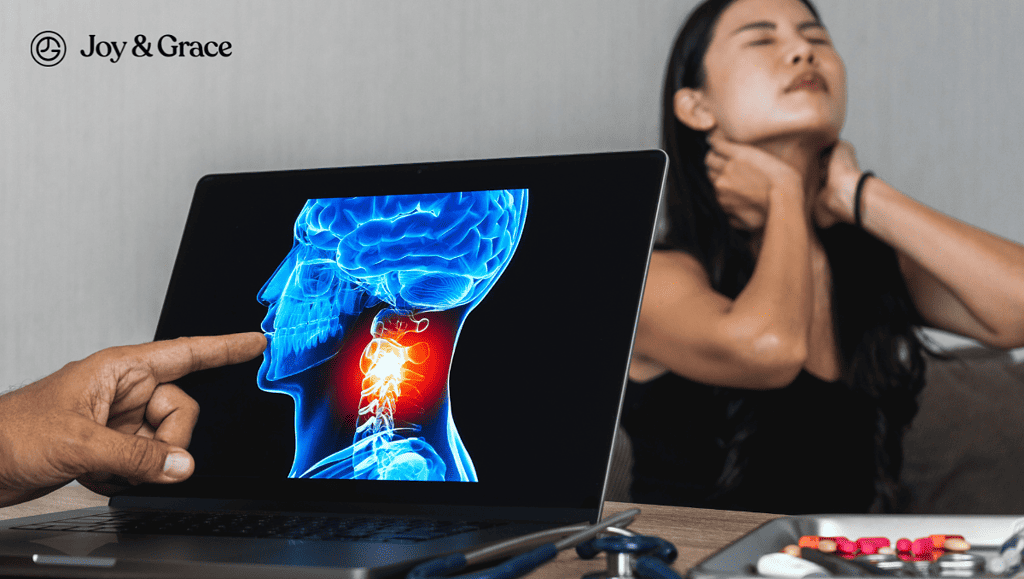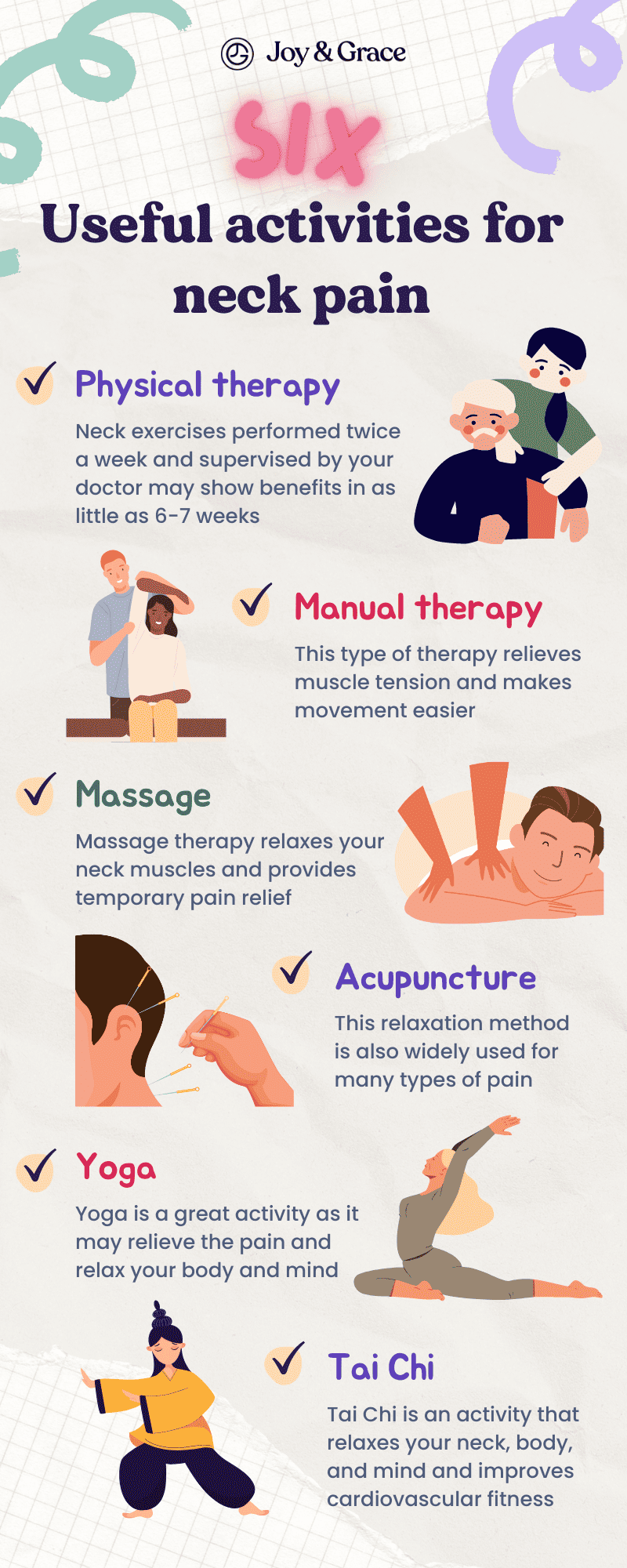To sufferers of neck pain,
Dealing with nagging neck pain can be a real challenge, but finding the right doctor to help you is the key to a speedy recovery. We'll be walking you through the various medical professionals specializing in neck pain. From diagnostics to effective treatments, we'll uncover the expertise of each specialist and how they can assist you in your journey toward a pain-free neck. So, get ready to discover the best doctor for neck pain relief.
What Kind of Doctor Should I See for Neck Pain?

Neck pain is a common condition that affects millions of people worldwide. Mild neck pain can be relieved with rest and self-treatment. But if your neck pain persists and worsens, you must seek medical attention. So, what medical specialist is the best for neck pain?
If you suffer from neck pain, we suggest you first see a Primary Care Physician (PCP).
Why do we say this? Well, the neck contains numerous structures that connect your head to the rest of the body. This means that there could be multiple causes for neck pain as well.
A PCP is the one who takes a first look at your neck and refers you to an adequate specialist if needed. This referral usually depends on the cause of the neck pain and the associated symptoms.
Aside from PCPs, the types of doctors who specialize in dealing with neck pain include the following:
- Physical Medicine and Rehabilitation Specialists,
- Sports Medicine Specialists,
- Orthopedic Surgeons.
These types of doctors can successfully evaluate & treat the majority of causes for neck pain.
However, for specific cases, some additional doctors can offer valuable insights and treatments:
- Neurologists and Neurosurgeons: If your neck pain is accompanied by neurological symptoms like tingling, numbness, or weakness, it may indicate nerve-related issues. In such cases, consulting a neurologist or a neurosurgeon is helpful. Neurologists specialize in nervous system disorders. They can conduct diagnostic tests, provide pain management, or recommend surgical interventions if necessary.
- ENT Surgeons (Otolaryngologists): Although they primarily focus on conditions related to the ear, nose, and throat, ENT surgeons can help diagnose and treat certain types of neck pain. For example, if your neck pain is associated with throat or swallowing issues, an ENT surgeon may be able to identify and address the underlying cause.
Let us dive in and explore what each of these specialists can do for neck pain.
Primary Care Physician (PCP)
Physical Medicine And
A Primary Care Physician, or PCP for short, is a doctor who offers primary care. A PCP can:
- Take your medical history and perform examinations
- Order blood and imaging tests
- Come up with an initial diagnosis for your problem
- Provide advice on how to manage your pain at home
- Prescribe painkillers and other medications
- Refer you to secondary or tertiary specialist care.
As we said, your PCP is the first point of contact for neck pain. If your neck pain is mild and you have no other underlying disease, your PCP may order some tests and recommend you treat your neck pain at home. Yes, you read that right! With the proper advice and guidance from your PCP, you may indeed treat your neck pain successfully, even at home.
But if your neck pain is severe and does not go away, your PCP can refer you to a specialist. This usually means that your pain needs further evaluation and more specialized care.
Do I Need a Referral from a PCP?
To know if you need a referral to see a specialist, check your medical insurance plan. Here you may find essential tips on US medical insurance plans. Make sure to keep yourself informed and plan your appointments beforehand.
Physical Medicine And Rehabilitation Specialist (PM&R Specialist)
Huh, is it just us, or does the name itself sound very specialized? Thankfully, this type of doctor is also called a PM&R Specialist or a Physiatrist.
Physiatrists are experts in restoring range of motion and function of body parts, including the neck. They can help you relieve your neck pain and effectively recover from it.

Physiatrists use various non-surgical methods and techniques, such as:
- Therapeutic exercises. Targeted physical exercises are designed to improve strength, flexibility, and mobility. In this way, they aid in the recovery and rehabilitation of neck pain.
- Prosthetics/Orthotics (Devices, such as neck braces or collars). These provide support and stabilization to the neck, promoting healing and reducing pain.
- Pain meds. Pain meds include nonsteroidal anti-inflammatory drugs (NSAIDs) and muscle relaxants. They are used to ease pain and reduce inflammation associated with neck pain.
- EMG (electromyography) and NCS (nerve conduction studies). These are diagnostic tests that evaluate nerve function. They can identify potential nerve damage or compression contributing to neck pain.
- Soft tissue, joint, and spine injections. Injections of medications, such as corticosteroids or local anesthetics can be applied directly into soft tissues, joints, or the spine to reduce inflammation and relieve neck pain.
- Musculoskeletal ultrasound. An ultrasound non-invasive imaging technique. It uses sound waves to create real-time images of the musculoskeletal system. Thus, it helps a lot in diagnosing and treating neck pain, etc.
Additionally, physiatrists work closely with other specialists to ensure you have the best recovery from your neck pain.
A little word of advice: do not confuse physiatrists with physical therapists! Physical therapists are not really medical doctors. Thus, they are not licensed to prescribe medications.
Sports Medicine Specialist
Sports medicine specialists are medical doctors who undergo special training for sports-related injuries. This is the type of doctor you should consult if you have injury-related neck pain.
Sports injuries to the head and neck are rare, but they can be life-threatening. Sports medicine specialists are prepared to act quickly, deal with the sustained neck injury, and refer to the emergency department if necessary. They approach neck injuries according to the ATLS (Advanced Trauma Life Support) protocols.
Sports medicine specialists deal with various injuries, which include the following:
- Fractures
- Sprains
- Spine injuries
- Tendon, ligament, and muscle injuries
- Exercise-induced asthma
- Heat illnesses
- Concussions and other head injuries.
They may recommend non-surgical or surgical treatment options based on the injury and pain. Speaking of surgical treatments, does a surgeon come in handy for neck pain at all? Let us find out.
When Should I See a Surgeon for Neck Pain?

Surgeons are doctors who specialize in surgery. Surgery is a broad specialty. Because it is so broad, it is divided into many sub-specialties which focus on one organ system or region of the body.
Surgeons who, among other things, deal with neck pain are called spine surgeons. The best surgeons for neck pain are:
- Orthopedic Surgeons
- Neurosurgeons
Surgery for neck pain is rarely needed. Here are a few of the scenarios in which consulting a surgeon would be a good idea:
- Your neck pain comes after experiencing a traumatic injury, such as whiplash. The injury might have caused damage to the spinal cord or vertebrae.
- Your neck pain becomes chronic. It persists for several weeks or months.
- Your neck pain spreads to your shoulders and arms.
- Symptoms such as numbness, weakness, and tingling accompany your neck pain. These could be signs of spinal cord and nerve compression or damage. The damage has to be confirmed by imagery before treatment.
- Conservative treatment does not relieve the pain. You tried non-surgical treatments, but they did not work. This often means that you should turn to surgery.
Surgery may relieve neck pain by:
- Decompressing a nerve root. This technique is commonly used for herniated discs. When a disc herniates, its inner portion sticks out and compresses a nerve root, causing neck pain.
- Decompressing the spinal cord. Spinal stenosis represents the narrowing of the spinal canal. It often requires surgery to relieve pressure on the spinal cord, pain, and other symptoms.
- Stabilizing the neck part of the spine. Surgical stabilization is often performed for medical conditions like cervical spondylosis. In spondylosis, degenerative changes in the spine cause instability and pain. Stabilization procedures can stabilize the neck part of the spine, reducing pain and improving function.
Orthopedic Surgeon
Orthopedic surgeons are medical doctors who specialize in dealing with musculoskeletal system disorders. They diagnose and treat injuries and diseases of the bones, muscles, tendons, and ligaments.
Orthopedic specialists may first suggest conservative treatment for your neck pain. But if the neck pain results from a more serious problem, surgery becomes a must.
When push comes to shove, orthopedic surgeons are the ones that have the last word for neck pain.
Orthopedic surgeons can identify and surgically treat various conditions responsible for neck pain. These include the following:
- Abnormal spine alignment (Scoliosis)
- Herniated disks
- Rheumatoid arthritis
- Cervical spondylosis
- Traumatic injuries
- Infections
- Spinal tumors
Neurosurgeon

A neurosurgeon specializes in diagnosing and treating central and peripheral nervous system disorders.
The neck contains the neck vertebrae, which protect the spinal cord. The spinal cord is a central structure from which peripheral nerves come out to carry impulses from the brain. In case of nerve damage or disease, the spinal cord and nerves may suffer and cause neck pain. This is where neurosurgeons come into play.
If your PCP suspects spinal nerve or cord damage, they may refer you to a neurosurgeon for further evaluation.
Disorders that neurosurgeons deal with may include any of the following:
- Congenital anomalies
- Trauma
- Tumors
- Blood vessel disorders
- Infections of the brain or spine
- Stroke
- Degenerative diseases of the spine.
ENT Surgeon: Does an ENT Treat Neck Pain?

ENT Surgeons are specialists in dealing with ear, nose, and throat disorders. So, ENT understandably stands for Ear-Neck-Throat.
As we mentioned right in the beginning, an ENT surgeon is normally not one of the first specialists you see for neck pain. But this does not mean this type of doctor is not helpful in this regard.
ENT surgeons deal with various diseases and conditions that affect the neck, such as:
- Neck lumps, which might develop into tumors.
- Skin cancer
- Graves’ Disease, etc
Neurologist: Can a Neurologist Diagnose Neck Pain?

We mentioned earlier that neurosurgeons surgically deal with neck pain from nerve or spinal damage. Well, neurologists specialize in nerve disorders too. The difference is that they treat neck pain with medications and injections instead of surgery.
A neurologist will first order some imaging tests to see the cause of your neck pain. Nerve damage often arises from degenerative changes (arthritis, spondylosis) and disk herniation.
You might be referred to a neurologist if the typical nerve damage symptoms accompany your neck pain. The symptoms of nerve damage include the following:
- Numbness in your shoulders, arms, and hands
- Weakness in your shoulders, arms, and hands
- Tingling in your hands and fingers.
Physical Therapist, Physiotherapist, and Chiropractor
So, what is the deal with these occupations? Can they help you relieve your neck pain?
Physical therapists, physiotherapists, and chiropractors perform sort of similar examinations and treatment methods. These methods aim to relieve pain and tension and promote movement and relaxation.
It is important to understand that these three professions are not true doctors. This does not mean that they cannot help. Always consult your PCP if paying a visit to a physical therapist, physiotherapist, or chiropractor would benefit you.
When to See a Doctor for Neck Pain?
Okay, so you are experiencing neck pain. You may wonder if simply changing pillows will get rid of it for good. Maybe OTC painkillers can do the trick?
Let us just say that the neck is too important to ignore. We recommend you seek advice from a doctor when you are worried about neck pain. Here are five scenarios when you should definitely see your healthcare provider:
- Your neck pain becomes severe and does not go away after a week.
- Your neck pain spreads to the shoulders, arms, and hands.
- The typical symptoms of nerve damage we discussed (numbness, muscle weakness, tingling) appear.
- Your neck pain comes along with headaches.
- You start experiencing neck pain after an accident or injury.
Is there a benefit to seeing a doctor? We say yes! Your doctor has the expertise to find the right diagnosis and provide the best treatment for you. Consulting your doctor about your complaints will provide faster recovery and improve your life quality in the long run.
What Doctor Treats Neck, Back, and Head Pain?
Again, your PCP is your best bet! Neck muscle pain can sometimes be treated at home. At other times your PCP may tell you to visit a specialist, such as a Physiatrist or an Orthopedic Specialist.
How Do Doctors Check Neck Pain?
Once you enter your doctor’s office, your healthcare provider will tell you to make yourself comfortable. You will be asked about your medical history. Your doctor may then conduct a few neck physical examinations. At last, your doctor may order you to do some imaging tests. Let us see how these procedures lead to a diagnosis.
How Are Back and Neck Pain Diagnosed?
As we mentioned, the first step toward the right diagnosis for your neck pain begins with your medical history. Your doctor will want to know about:
- The symptoms and the possible underlying sinister cause of your neck pain.
- The duration of neck pain. Depending on the duration, neck pain may be classified as follows:
- Acute (the pain lasts for less than six weeks)
- Sub-acute (the pain lasts for 6-12 weeks)
- Chronic (the pain lasts for more than 12 weeks)
- The origin of your neck pain. Your neck pain may be nerve-related or somatic.
- Potential “so-called” yellow flags. Yellow flags are psychosocial signs that point to a long-term illness or disability. These include things like the belief that spinal pain can be severely disabling, social or financial problems, less activity, and the presence of a compensation claim.
After taking your answers, the healthcare provider will physically examine your neck.
What Are the Tests for Neck?

There is a wide range of tests or examinations for neck and neck pain. Neck pain tests are performed to achieve the following goals:
- Examination of posture, symmetry, muscle development, and previous injuries.
- Examination of tenderness when touching or palpating the neck.
- Examination of the full range of neck movement.
- Neurological examination for possible nerve damage.
After a thorough physical exam, you may need to undergo some tests. These include blood tests for possible infections, imaging tests, and other tests.
Imaging tests are preferred, especially if a neck injury is suspected. The most useful imaging tests for neck pain are:
Can a CT Scan Show Neck Problems?
CT and MRI scans are more advanced imaging methods, usually used only after a radiograph has been performed. A CT or MRI applies when the following conditions are suspected:
- Malignancy,
- Infection,
- Spinal cord compression, and
- Disc herniation
A CT is great for visualizing bones. On the other hand, an MRI is superior for soft tissues and spinal cord or nerve root compression.
Other tests include the myelogram and electromyogram (EMG). These tests measure nerve impulses and assess the function of the muscles and nerves.
Treatment of Neck Pain: Can Doctors Fix Neck Pain?

Treatment of neck pain depends on the cause and duration of neck pain. Acute neck pain may resolve spontaneously. According to a study, more than a third of people with neck pain will still have low-grade symptoms or recurrent pain a year later.
Treatment of neck pain usually involves the use of medications. For mild neck pain, your doctor will usually prescribe Tylenol or Ibuprofen. Muscle relaxants and corticosteroid injections may be effective for more severe and chronic neck pain.
For better results against neck pain, medications can be combined with some form of activity or alternative treatment plan. The most useful activities for neck pain may include:
- Physical therapy. Neck exercises performed twice a week and supervised by your doctor may show benefits in as little as 6-7 weeks.
- Manual therapy. This type of therapy involves “spinal manipulation.” This type of therapy relieves muscle tension and makes movement easier.
- Massage. Massage therapy relaxes your neck muscles and provides temporary pain relief.
- Acupuncture. This relaxation method is also widely used for many types of pain.
- Yoga. Yoga is a great activity as it may relieve the pain and relax your body and mind.
- Tai Chi: Tai Chi is an activity that relaxes your neck, body, and mind and improves cardiovascular fitness.
Consult your doctor before deciding on doing any of the activities we mentioned. In some cases, exercises for neck pain are not recommended. So, make sure to avoid worsening the pain.
If you want to get rid of neck pain, you should also change some of your daily habits. Pay attention to how you sit or sleep. Here are some recommendations to improve your posture while sitting or sleeping.
Your doctor may also suggest you wear a neck collar to support and immobilize your neck. These collars may reduce neck pain but should only be used for a day or two.
Psychosocial factors should always be addressed as well. Chronic neck pain may add to depression or substance abuse disorder. Counseling, along with medical treatment, may help in recovery.
Surgery for neck pain is only rarely needed.
How Do I Relieve Neck Pain at Home in 5 Minutes?
In mild neck pain cases, you might also quickly ease your neck pain at your own home!
- Use a heating pad in a low or medium setting.
- Apply it on your neck for 15–20 minutes every 2–3 hours.
- If you dislike the heat, apply an ice pack to your neck for 10–15 minutes every 2–3 hours.
Takeaway
Neck pain is a common condition that affects millions of people worldwide. It has a wide range of causes.
For neck pain, we suggest you first see a Primary Care Physician (PCP). A PCP is the one who takes a first look at your neck and refers you to an adequate specialist.
Aside from PCPs, the types of doctors who specialize in dealing with neck pain include the following:
- Physical Medicine and Rehabilitation Specialists
- Sports Medicine Specialists
- Orthopedic Surgeons
- Neurosurgeons
Consulting your doctor about your complaints will provide faster recovery and improve your life quality in the long run.
Diagnosis of neck pain includes:
- Taking your medical history
- Performing neck examinations
- Undergoing imaging and blood tests.
Treatment of neck pain depends on the cause and duration of neck pain. Acute neck pain may resolve spontaneously.
Neck pain is usually treated with medications. For mild neck pain, your doctor will usually prescribe Tylenol or Ibuprofen. Medications can be combined with some form of activity to achieve a better effect against acute or chronic neck pain.
Surgery for neck pain is only rarely needed.














